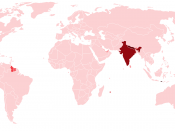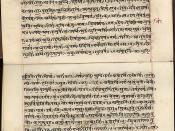Hinduism
By: Jon Kotler
There are many different Eastern philosophies and religions that share similar ideas and concepts. The basis for these ideas mainly come from Hinduism, which is said to be the world's oldest known philosophy. Hinduism originated in India, which is one of the oldest civilizations on the planet, from ancient texts known as the Vedas (or wisdom books). These ancient texts that consist of ancient hymns, rituals, and teachings, are considered by many to contain the essence of Hindu thought. As Hinduism spread east, different interpretations of its ideas were developed into other philosophies. Therefore, Buddhism, Confucianism, and Taoism, amongst others of course, share a lot of the same or similar cultural traits and ideas. One main cultural aspect that really captures the way that Easterners or more specifically Hindus think is Haiku poetry.
Haiku poems are contemplative poems that valorize nature, color, season, contrasts, and surprises.
They usually have three lines and seventeen syllables and are distributed in five, seven, five structure. These poems must register or indicate a moment, sensation, impression or drama of a specific fact of nature. Bill Higginson says, "The primary purpose of reading and writing haiku is sharing moments of our lives that have moved us, pieces of experience and perception that we offer or receive as gifts. At the deepest level, this is the one great purpose of all art, and especially of literature."
Basho, a well-known Eastern poet who lived from 1644 to 1694, once wrote a Haiku. When translated into English the poem goes as follows:
When I look carefully
I see the nazuna blooming
By the hedge!
It is probable that Basho was walking along a country road when he noticed something hiding behind a hedge. He approached closer, took a good look at it, and...



A
Great essay with well structured parallels in paragraphys
1 out of 1 people found this comment useful.